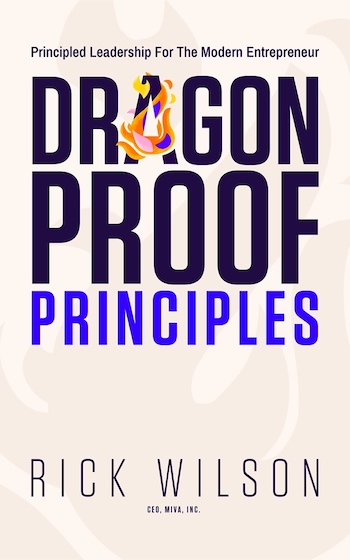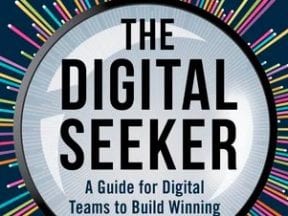Editor’s note: Rick Wilson is the longtime CEO of Miva, the pioneering ecommerce platform. Wilson first joined the company in 1999 as director of sales. In 2009, he and an investor group acquired it. His new book, “Dragonproof Principles: Principled Leadership For The Modern Entrepreneur,” is now available. What follows is “Principle Two: Entrepreneurialism Is a Noble Art,” an excerpt.
I want to dig into the spirit of being an entrepreneur. The noble spirit.
It’s important to define the difference between an entrepreneur and a business person, as they sound like the same thing, but they’re not. An entrepreneur is someone who has a vision for an idea, or a product. Steve Jobs and Elon Musk are frequently brought up in this light. The ultimate entrepreneurs.
Elon wanted to change the world around clean energy, specifically via electric cars and solar, and he found an existing business that he took over to do it. Steve Jobs foresaw the personal computer revolution, sitting at the intersection of liberal arts and technology. For the ultimate successful entrepreneurs, insight and ambition are driven by passion… big passion. They quite explicitly set out to change the world.
An entrepreneur could also be someone who just wants to control their day-to-day life, or who views life the way an artist does, and they’re passionate about the art. They create from that point of view to the point of compulsion. You hear actors or musicians talk about this all the time. They are asked, “How did you become so successful?” And they tell you they simply didn’t have any other choice. They work from a calling they don’t even necessarily understand.
Contrast that to a “business person” – someone who has likely studied, maybe has an MBA or a degree in business or was raised in the family business. A business person is someone who has studied the science and art of running a business, and they have applied that training to their project. As a bit of a trope, we tend to think of business people as more pragmatic than passionate, as forging businesses intentionally, rather than serving some mysterious driver within the soul.
You can be both an entrepreneur and a business person, but not all entrepreneurs are business people, and not all business people are entrepreneurs. Really the question you have to ask yourself is, do you have the stomach for being an entrepreneur? Are you personally prepared to have total command of a business and to shepherd that baby through every stage of its development? A business is not a human or a life, but it’s still living and breathing and taking up your time and your mind and your passion, and you’ll have as many knots in your stomach about that as you will almost anything else. So, do you want to do that?
Is that something that when I ask the question, you immediately say, “YES, that’s what turns my gears. That’s what I want to do!” Or, does the thought of the entrepreneurial life make you cringe? Because if it makes you cringe, you’re probably not an entrepreneur. The ideal attitude for an entrepreneur is someone who hears what I just said and thinks, “Wow, that’s me. I’ve got to do that.”
I can speak to this moment for myself. I didn’t have to be the creator of the business from scratch. I was certainly happy to take someone else’s business and build it up. I just had to be an entrepreneur. I didn’t have a choice. I had to be the person building something, whether I started with an existing building block or started it from scratch. In fact, I often tell people that I don’t think I was all that great of an employee because all I was always thinking about was how I would do it if I ran the company.
I often see a type of person who thinks they’re an entrepreneur, who isn’t. This person often mistakes the idea they have as the thing of value. If you ask someone like this about their business, they say, “Oh, I can’t tell you about it, because I don’t want anyone to steal it.” They have this perception that an idea is the thing of value, and all you need is one great idea. I disagree.
We are saturated with media storylines about “one great idea” projects that made their inventors fortunes. It’s practically a modern historical myth. How many people tried to start a business because someone said to them, “Hey, did you hear about the guy who invented the pet rock and made a million dollars?” That’s a true story, but it unfortunately misses the point of how a real entrepreneur makes money. Yes, you need an idea. It can be your idea or someone else’s, but once you have an idea, it’s all about execution. It’s all about understanding why people in the market want to buy the thing, it’s about how you’re serving your customers, and most importantly it’s about your desire to captain that ship. The idea ends up being secondary to all of these things!
It’s All About Execution
I have a friend who went to Harvard Business School. Amazingly brilliant guy. I don’t know if I would say he’s an entrepreneur, but he’s definitely an interesting alternative thinker. He wrote his Harvard MBA thesis back in 1992 on a future digital medium for the distribution of music, and the ability to contain a whole music catalog in your pocket. Now, if that sounds familiar, it’s because that exact concept became the iPod and iTunes. However, my friend wasn’t the inventor of the iPod or iTunes. He had nothing to do with their development. He never worked for Apple. He never met Steve Jobs. His idea never went anywhere beyond that piece of paper. Was it a great idea? Absolutely. This is one of those times where history can tell you, yes, it was a great life-changing idea, but that idea did not make him rich, nor did it make him an entrepreneur. He left it in the drafts.
That’s the difference between someone who’s a true entrepreneur and someone who is “only” brilliant. An entrepreneur is going to take an idea and they’re going to be like a bulldog and fight and fight and fight. Through this, that idea is going to become real. Every entrepreneur I know who’s ever succeeded has fought through those valleys and crested those peaks to eventually get there. If you don’t have the stomach for being an entrepreneur, the outcome is very simple and very predictable.
You will quit before you go very far.






